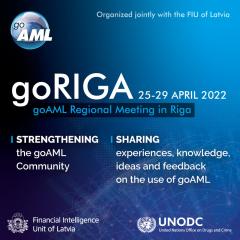UNODC SPMS Achievements During COVID-19 Lockdown
During the global COVID-19 pandemic lockdown, UNODC Software Products for Member States worked with member states in innovative ways to strengthen its support using modern telecommuting technologies.
Until this crisis, many SPMS deployment tasks were conducted through onsite interactions, but in the current situation, designing and developing features with member states, conducting acceptance testing, deploying installations and providing training had now to be done using webinars and collaboration tools. This includes the design and deployment of the goAML ESW Export/Import feature, the goAML Web Report Configurator, new installations for all SPMS software and member states going live. Lockdown restrictions meant everyone had to step up to this new normal and all activities listed in this article were conducted by persons staying at home. The achievements were significant and this was a very constructive phase for SPMS and the User Community. Adaptation was vital in overcoming the barrier and a testimony of human resilience and creativity.
What happened?
- The goAML Web Form Configurator was the most requested feature for goAML Web from the User Community and was developed during lockdown. It allows countless customization combinations according to agency type and report type.
- Training webinars were undertaken to 10 member states at a time for the new goAML Web Forms, and online beta testing platform, as well as e-learning tutorials were provided.
- The goAML Business Intelligence module was deployed fully to the UAE during the lockdown with a series of remote training webinars and a set of video tutorials to complete the implementation.
- A first, Iceland went live with goAML during the lockdown to support its status with FATF. This was achieved with a series of remote support sessions with SPMS
- The integration of goAML with Egmont Secure Web, a long-awaited feature by the FIU user community and the Egmont group, was designed and developed entirely during the lockdown, using webinars and the virtual community platform to communicate with member states, who were partners in the design.
- Remote accessibility and work continuity. Most SPMS products functioned normally fully remotely. Governments and intelligence analysts were able to undertake their work from home.
- A global survey conducted during the lockdown showed that goAML installations encompass, in the most conservative estimates, half a billion suspicious transactions, 100,000 users in intelligence agencies and financial entities using goAML, and 80,000 reporting entities around the world in 57 member states.
- .Net Core Framework was integrated as an update to the components of goAML during the lockdown, for elastic search and other features. This was a significant innovative change in the backbone of goAML.
- goAML was installed in Kenya and two other new implementations.
- NDS’s Major Upgrade for Finland was done remotely for the first time and other member states upgrades are following.
- Four Member States joined the SPMS family during the lockdown for goAML, goCase and NDS software.
In conclusion
Until recently, telecommuting technologies were used occasionally, leaving in-depth activities to onsite work. The crisis showed that a lot can be achieved with telecommuting technologies when faced with the barriers of a lockdown, leaving just a few tasks requiring onsite presence.
As the pandemic brought to surface the need for best practices, all the activities listed above including development, deployment, testing and initiation training were conducted remotely.
UNODC SPMS will further the exploration of such support methods to increase the efficiency and capacity of its services to member states, even if personal contact will remain necessary in some cases.

